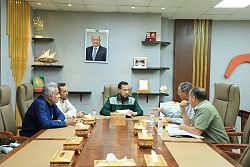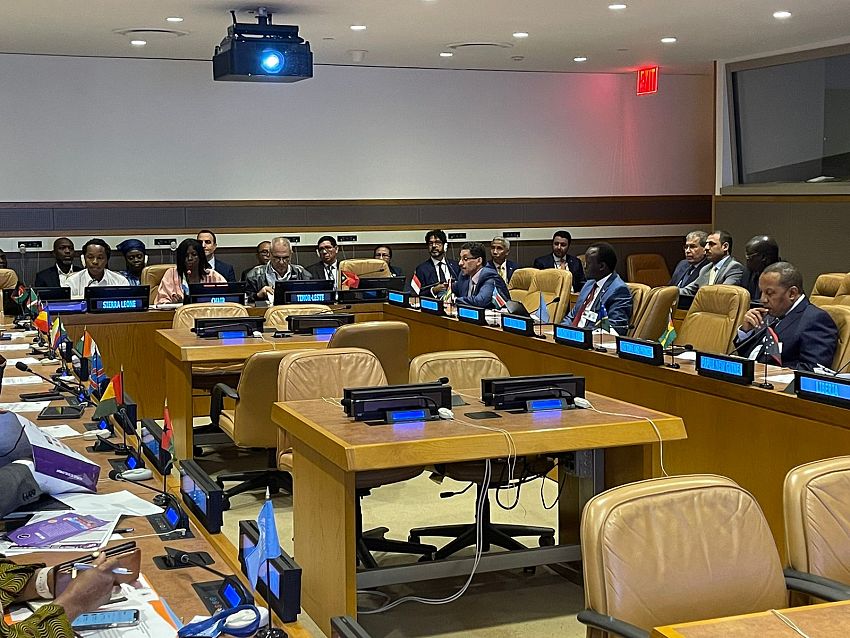
Aden Governor Reviews Plan for Establishing Industrial Zone in Al-Alam
Minister of State and Governor of Aden, Abdulrahman Sheikh, discussed on Thursday the plan for establishing an industrial zone project in the Al-Alam area of Aden.

OCHA: Regional Escalation Directly Impacting Humanitarian Conditions in Gaza and the West Bank
United Nations Office for the Coordination of Humanitarian Affairs has warned that ongoing regional escalation is directly worsening the humanitarian situation in Gaza and the West Bank.

Korea large companies' exports rise 10 percent
Large companies' exports in South Korea rose approximately 10 percent year-on-year in the fourth quarter of last year, driven by increased global demand for semiconductors.

Saudi League: Al-Nassr, Al-Ettifaq and Neom Secure Victories Over Al-Ittihad, Damac and Al-Riyadh
Al-Nassr defeated its guest Al-Ittihad 2–0 in the match that brought them together at Al-Awwal Park Stadium in Riyadh, as part of the 21st round of the Saudi Professional League.
Last Update: ،
2026/03/05
Time
01:53:21
Latest News:
 Yemeni Ambassador Discusses Developments in Yemen with Cuban Deputy Foreign Minister
Yemeni Ambassador Discusses Developments in Yemen with Cuban Deputy Foreign Minister
 Marib Dep.G Launches Housing Project for Orphans with Turkish Funding
Marib Dep.G Launches Housing Project for Orphans with Turkish Funding
 President al-Alimi Meets with Crisis Management Committee to Review Response Options to Regional Developments
President al-Alimi Meets with Crisis Management Committee to Review Response Options to Regional Developments
 Minister of Electricity discusses with UNDP joint cooperation
Minister of Electricity discusses with UNDP joint cooperation
 Minister of Technical Education Discusses Development of Vocational Education System with UNESCO Regional ..
Minister of Technical Education Discusses Development of Vocational Education System with UNESCO Regional ..
Latest News:
 Yemeni Ambassador Discusses Developments in Yemen with Cuban Deputy Foreign Minister
Yemeni Ambassador Discusses Developments in Yemen with Cuban Deputy Foreign Minister
 Marib Dep.G Launches Housing Project for Orphans with Turkish Funding
Marib Dep.G Launches Housing Project for Orphans with Turkish Funding
 President al-Alimi Meets with Crisis Management Committee to Review Response Options to Regional Developments
President al-Alimi Meets with Crisis Management Committee to Review Response Options to Regional Developments
 Minister of Electricity discusses with UNDP joint cooperation
Minister of Electricity discusses with UNDP joint cooperation
 Minister of Technical Education Discusses Development of Vocational Education System with UNESCO Regional ..
Minister of Technical Education Discusses Development of Vocational Education System with UNESCO Regional ..
FM: Yemen is suffering difficult economic & humanitarian conditions as a result of Houthi coup
[22/09/2023 08:15]
New York - Saba
Minister of Foreign Affairs, Dr. Ahmed bin Mubarak, said that Yemen is suffering difficult economic and humanitarian conditions as a result of the Houthi militias’ coup against the constitutionally legitimate government, in addition to the consequences of the covid-19 pandemic and the recent geopolitical challenges.
He added in our country's statement at the high-level summit of the G7+, which was held on the sidelines of the United Nations General Assembly meetings in New York City, USA, that this matter led to the deterioration of the national economy, a decrease in job opportunities, a deterioration in the exchange rate of the national currency, a contraction of the national economy by more than 50 percent, a disruption to the accelerated economic and human development, in addition to the decline of the meager gains that our country had achieved before the war.
He pointed out that the weak purchasing power of citizens has become the biggest driver of the risk of famine that threatens millions of Yemenis, indicating that the collapse of the private sector, the migration of capital and qualified personnel, and the deterioration of services in key sectors such as electricity, education, and health have led to a doubling of the size of the negative effects on the economy.
Bin Mubarak stressed that the Yemeni government is working to stop the economic deterioration by making more efforts to mobilize resources and provide the necessary support to combat inflation, provide basic goods and services, and work to resume the work of national and revenue institutions, aware of the close connection between peace and development, and keen to mitigate the economic and humanitarian impacts of war.
Minister Bin Mubarak also indicated that the countries of the group are facing challenges affected by conflicts, the severity of which has been exacerbated by the repercussions of the covid-19 pandemic, supply chain disruptions, rising commodity prices, devaluation of currencies, and climate-related disasters, in addition to international geopolitical tensions that have increased the complexity of these challenges, which have caused a multiplication of the humanitarian crisis.
He said, "We live in an era in which the world's challenges are growing urgently and rapidly, and the gaps between peoples and nations appear deeper than they were in the past, and global solidarity is the only way to confront these challenges and build a world characterized by justice and prosperity for all. It is our historical duty to unite in the face of these common difficulties and to work together to achieve our common goals.”
The Foreign Minister urged the group to exert more effort, speak with one voice, enhance collective advocacy, and benefit from the best lessons to achieve the group’s common agenda and obtain the necessary support to restore political and economic stability.
Minister of Foreign Affairs, Dr. Ahmed bin Mubarak, said that Yemen is suffering difficult economic and humanitarian conditions as a result of the Houthi militias’ coup against the constitutionally legitimate government, in addition to the consequences of the covid-19 pandemic and the recent geopolitical challenges.
He added in our country's statement at the high-level summit of the G7+, which was held on the sidelines of the United Nations General Assembly meetings in New York City, USA, that this matter led to the deterioration of the national economy, a decrease in job opportunities, a deterioration in the exchange rate of the national currency, a contraction of the national economy by more than 50 percent, a disruption to the accelerated economic and human development, in addition to the decline of the meager gains that our country had achieved before the war.
He pointed out that the weak purchasing power of citizens has become the biggest driver of the risk of famine that threatens millions of Yemenis, indicating that the collapse of the private sector, the migration of capital and qualified personnel, and the deterioration of services in key sectors such as electricity, education, and health have led to a doubling of the size of the negative effects on the economy.
Bin Mubarak stressed that the Yemeni government is working to stop the economic deterioration by making more efforts to mobilize resources and provide the necessary support to combat inflation, provide basic goods and services, and work to resume the work of national and revenue institutions, aware of the close connection between peace and development, and keen to mitigate the economic and humanitarian impacts of war.
Minister Bin Mubarak also indicated that the countries of the group are facing challenges affected by conflicts, the severity of which has been exacerbated by the repercussions of the covid-19 pandemic, supply chain disruptions, rising commodity prices, devaluation of currencies, and climate-related disasters, in addition to international geopolitical tensions that have increased the complexity of these challenges, which have caused a multiplication of the humanitarian crisis.
He said, "We live in an era in which the world's challenges are growing urgently and rapidly, and the gaps between peoples and nations appear deeper than they were in the past, and global solidarity is the only way to confront these challenges and build a world characterized by justice and prosperity for all. It is our historical duty to unite in the face of these common difficulties and to work together to achieve our common goals.”
The Foreign Minister urged the group to exert more effort, speak with one voice, enhance collective advocacy, and benefit from the best lessons to achieve the group’s common agenda and obtain the necessary support to restore political and economic stability.
Key words:
constitutionally - Saba Minister - multiplication - characterized - international - opportunities - repercussions - deterioration - institutions - Minister - Aden Governor Reviews Plan for Establishing Industrial Zone in Al-Alam
Aden Governor Reviews Plan for Establishing Industrial Zone in Al-Alam Yemeni Ambassador Discusses Developments in Yemen with Cuban Deputy Foreign Minister
Yemeni Ambassador Discusses Developments in Yemen with Cuban Deputy Foreign Minister Marib Dep.G Launches Housing Project for Orphans with Turkish Funding
Marib Dep.G Launches Housing Project for Orphans with Turkish Funding President al-Alimi Meets with Crisis Management Committee to Review Response Options to Regional Developments
President al-Alimi Meets with Crisis Management Committee to Review Response Options to Regional Developments Minister of Electricity discusses with UNDP joint cooperation
Minister of Electricity discusses with UNDP joint cooperation Minister of Technical Education Discusses Development of Vocational Education System with UNESCO Regional Center
Minister of Technical Education Discusses Development of Vocational Education System with UNESCO Regional Center  SPRDY signs agreement to implement agricultural value chain project in 3 governorates
SPRDY signs agreement to implement agricultural value chain project in 3 governorates Minister of Agriculture Discusses with UNDP Interventions in Agricultural, Fisheries Sectors
Minister of Agriculture Discusses with UNDP Interventions in Agricultural, Fisheries Sectors Prime Minister urges escalating efforts to control crimes targeting public funds
Prime Minister urges escalating efforts to control crimes targeting public funds Minister of Culture, Tourism Discusses Support for Peace Efforts in Yemen with Berghof Foundation President
Minister of Culture, Tourism Discusses Support for Peace Efforts in Yemen with Berghof Foundation President 


